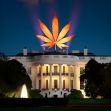New York legislators inched closer to sealing a deal with the office of Governor Andrew M. Cuomo this week to legalize recreational marijuana and expand the current medical marijuana program in the state. Democrats are hopeful the law could pass as early as next week as a stand-alone bill outside of the budget package set to be signed on April 1.
The deal would legalize cannabis for adults 21 and older, allow the delivery of the drug, permit “consumption sites” for marijuana (but not alcohol), and would allow for individuals to cultivate up to six marijuana plants at home for personal use.
What is most progressive about the bill, however, is not the marijuana itself, but what the state has in mind to do with tax revenues they estimate to come from the potential $4.2 billion industry. An estimated $350 million in yearly tax revenues, according to preliminary estimates, would be entirely re-invested into minority communities. Of this, 40% would go to populations that have historically been disproportionately affected by New York’s strict drug laws. Another 40% would go for public education, and the remaining 20% would be spent on general drug treatment, prevention, and education.
If the law is to pass, it would also remove penalties for individuals in the possession of fewer than three ounces of the substance and automatically expunge the record for people who have been convicted in the past for activities that would no longer be illegal under this new law. In July of 2019, the state decriminalized the possession of small amounts of the substance, punishing individuals with a fine, rather than with jail.
Additionally, lawmakers want to expand the medical marijuana program in the state, which began in 2014 as a seven-year pilot program. The list of qualifying medical conditions would be expanded, patients could choose to smoke or vape the substance, the current 30-day limit of supply would be expanded to 60 days, and medical marijuana companies would be able to enter the recreational marijuana market. The current medical marijuana program does not allow for patients to smoke the drug; only vaping, edibles, and tinctures are permissible.
Lawmakers view legalizing marijuana as not only a way for New York to prosper economically and create thousands of jobs, but they see this as a way to make amends with blacks and Hispanics in New York who are more likely to be convicted on low-level marijuana charges than white people. Liz Krueger, a Democratic State Senator, told the New York Times that, “when this bill is finally voted on and signed, New York will be able to say we have finally undone damaging criminal justice laws that accomplished nothing but ruining people’s lives.”
The goal is to create “equity programs” and reserve a portion of the licenses to what they define as “equity applicants.” These individuals include disabled veterans, minority-owned businesses, women-owned businesses, and people who have a family member with a previous marijuana conviction. Additionally, loans and grants will be provided for communities who wish to enter the industry but who will have greater obstacles in their way, such as small farmers and minority community members.
In 2019, the state tried to pass the Marijuana Regulation and Taxation ACT (MRTA), but legislators and Governor Cuomo could not reach an agreement over how to spend the tax revenue and how to allocate and authorize business licenses. The deal was set to be revisited in 2020, but the COVID-19 pandemic interfered with any attempt to begin the discussion again.
Earlier this month, the Office of Personnel Management (OPM) issued a memo stating use or possession of marijuana does not “automatically” disqualify an individual from federal employment. Federal employees are subject to routine drug testing and are still prohibited from using marijuana, regardless of whether their home state has legalized the substance.
While marijuana is still categorized as a Schedule I controlled substance, the grouping of drugs with the highest level of control and penalties, OPM acknowledges that “fifteen states and the District of Columbia have removed criminal prohibitions on medical and recreational marijuana use by adults 21 or older, and an additional 33 states permit medical use of marijuana.” The Drug-Free Federal Workplace Executive Order is still in effect. But OPM's declaration is a sign that the federal government is moving in the same direction as states in legalizing marijuana.






